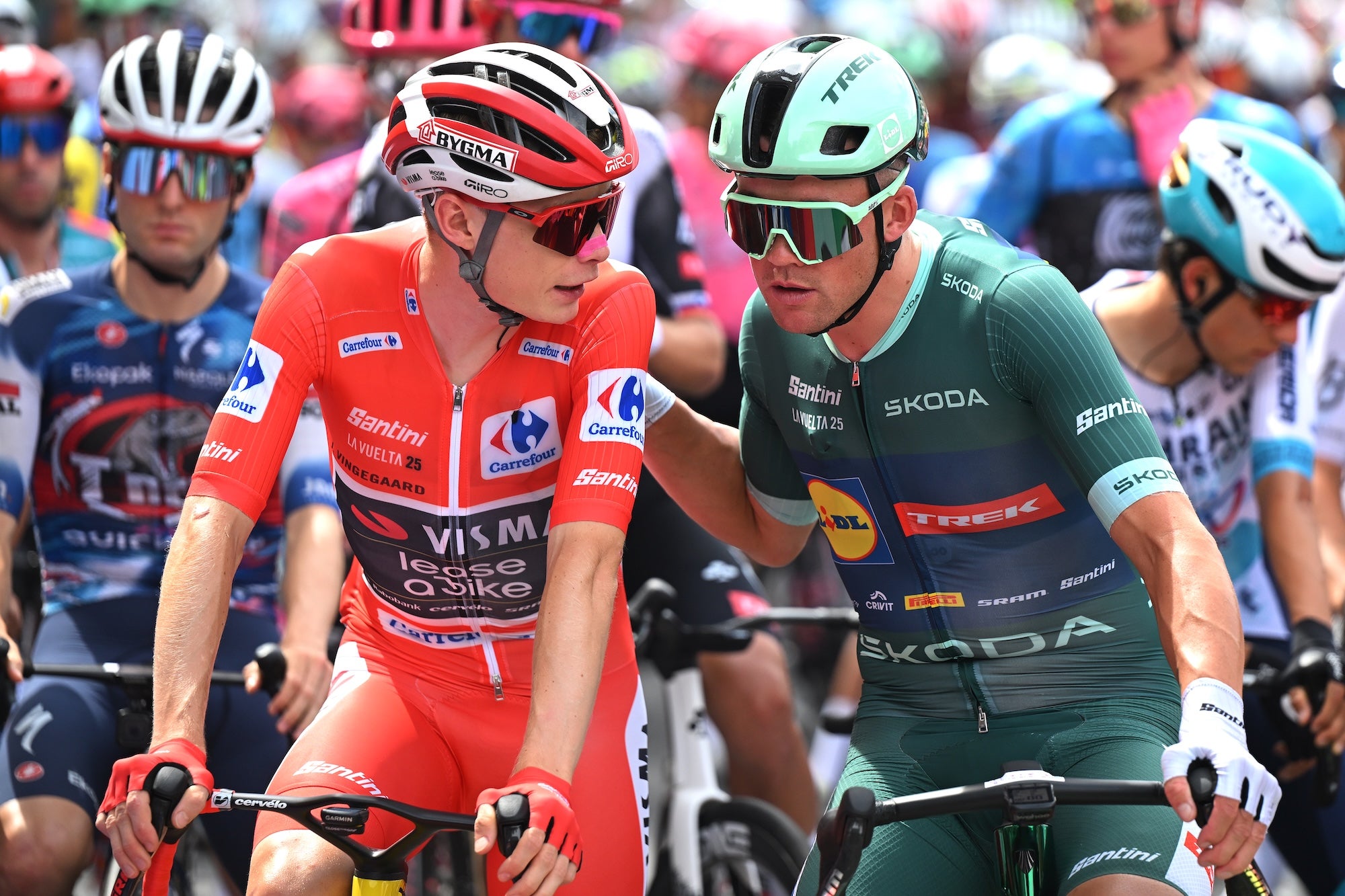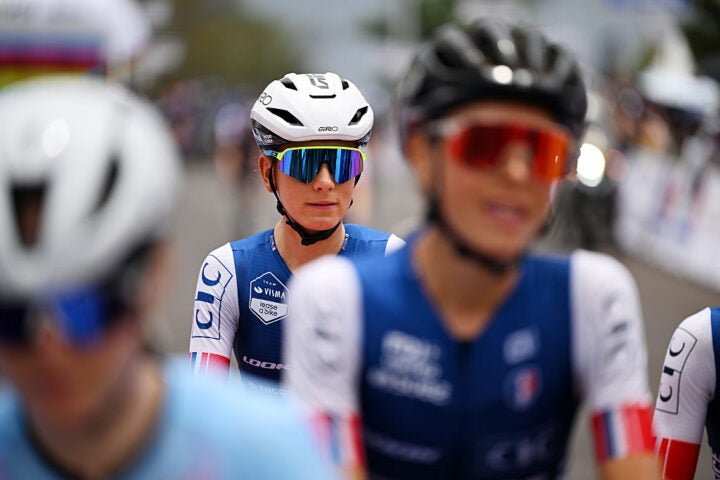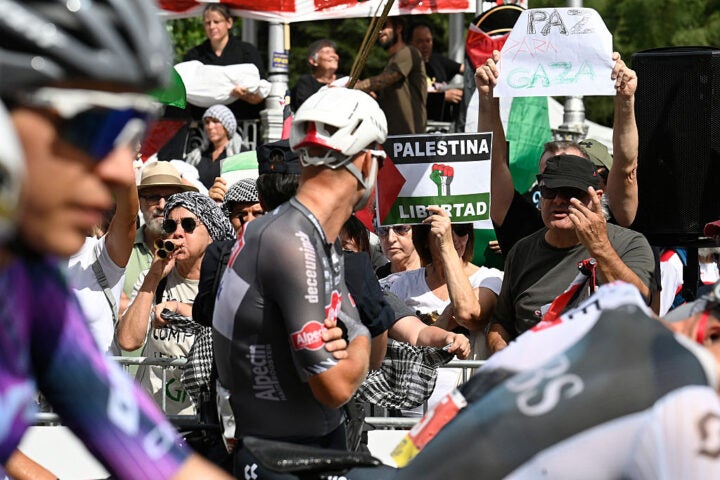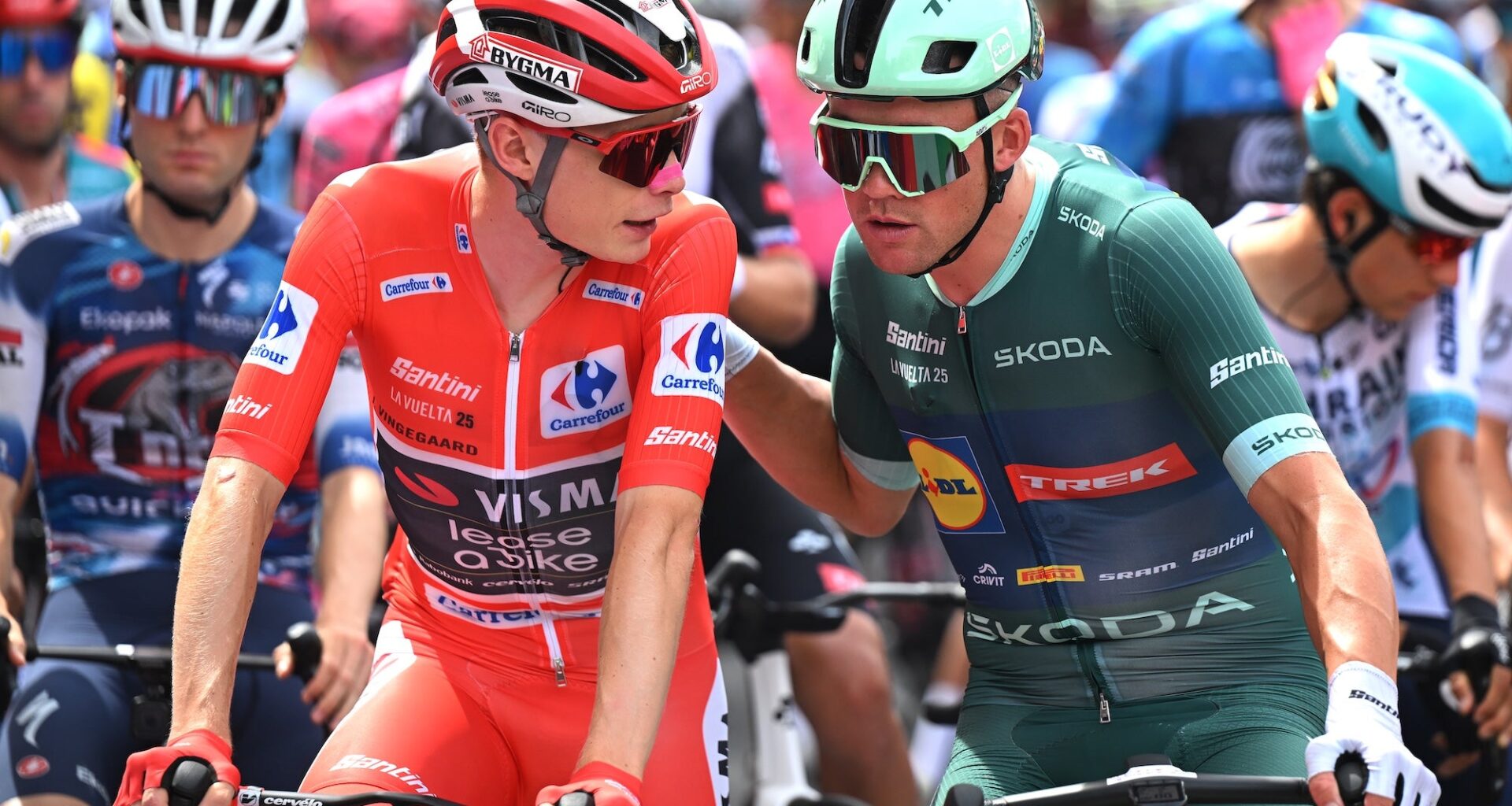Do the Euros even matter? This year they do, but there are growing worries about more protests after Israel vows to bring athletes to the annual event.

Vingegaard and Pedersen, shown here at the Vuelta, are both lining up. (Photo: Dario Belingheri/Getty Images)
Published September 30, 2025 01:46AM
It’s a long trip from Rwanda to the Drome-Ardeche regions of southern France, but both recently crowned world champions Tadej Pogačar and Remco Evenepoel are making the journey to the Rhone valley, where the 2025 UEC European Road Championships are being staged this week.
Usually, the “Euros” play second fiddle to the worlds, but the combination of flight times, post-Vuelta fatigue and high altitude racing was enough to ensure a fair degree of “no-shows” for the first African Worlds.
Instead, in a sign of the growing appeal of the Euros, there is a high-quality, elite field gathering in the Drome-Ardeche, a hilly, rural location, within reach of the mighty Rhone river and midway between French cities Lyon and Marseille.
In the men’s racing, alongside Rwanda medalists Pogacar and Evenepoel, are Vuelta hitters, including race winner Jonas Vingegaard, podium finisher João Almeida, and points classification winner Mads Pedersen.
The prospect of an in-form and motivated “big three” — Pogačar, Evenepoel and Vingegaard — going head-to-head on the winding, hilly and grippy roads through this rural region of stone farmhouses, quiet villages and steep climbs, could make for enthralling racing.
The French may also hope to do better than in Rwanda, with Romain Gregoire, winner of this year’s Tour of Britain, Paul Seixas, the recent Tour de l’Avenir champion, and Tour de France Femmes winner Pauline Ferrand-Prévot also strong contenders.
Denmark, in particular, has assembled a strong team for the men’s road race, with Vingegaard backed by Pedersen and Mattias Skjelmose, both of whom could be contenders if the Vuelta winner is marked out by rivals.
Do the Euros even matter? This year they do
 Ferrand-Prévot is among many stars flying from Rwanda to France. (Photo: Dario Belingheri/Getty Images)
Ferrand-Prévot is among many stars flying from Rwanda to France. (Photo: Dario Belingheri/Getty Images)
Over five days, 14 European titles will be up for grabs. As at the worlds, there are junior, U-23, mixed and elite categories, so even with some final tweaking still likely to start lists, there will be some familiar faces from the racing in Rwanda.
Like the worlds and Olympic competition, cyclists compete with national selections rather than their full-time pro teams.
First up, on October 1, is the men’s time trial with — assuming all his flight connections work — Olympic and world time trial champion Evenepoel leading the way.
The Belgian may still be smarting from the minor meltdown in Kigali that robbed him of the chance to go head-to-head with Pogačar in the final laps of the men’s road race, but with Almeida, Josh Tarling, Stefan Küng, and Filippo Ganna all racing on the mainly flat 24-kilometer course, Evenepoel is definitely the man to beat.
Marlen Reusser, dominant in the women’s time trial in Rwanda, is expected to race, with Olympic silver medalist Anna Henderson also competing. 2024 Tour de France Femmes winner Kasia Niewiadoma and her successor, Ferrand-Prévot, are expected to be major protagonists in the women’s road race.
At just over 200 kilometers, the men’s road race is less of a challenge than last Sunday’s African marathon, although it still contains 3,300 meters of climbing, some of which — like the Val d’Enfer, tackled six times — is familiar to the peloton from the spring one-day race, Faun Ardeche Classic.
The women’s road race is a punchy 116 kilometers, but includes over 2,200 meters of altitude gain. Racing in front of a partisan home crowd, Ferrand-Prévot may prove a lot more prominent than she was in a surprisingly muted performance in Kigali.
Bracing for Vuelta-style protests
 Everyone’s bracing for a repeat of scenes from last month’s Vuelta a España. (Photo: MIGUEL RIOPA/AFP via Getty Images)
Everyone’s bracing for a repeat of scenes from last month’s Vuelta a España. (Photo: MIGUEL RIOPA/AFP via Getty Images)
But while there is much to look forward to on the road, there are concerns about what might happen off the road, with Israel sending a group of riders to compete.
In the aftermath of the Vuelta demonstrations by pro-Palestine protestors, French federation president Michel Callot has done his best to calm concerns of any repeat of the race disruptions experienced in Spain.
Israel is understood to have sent 13 riders to France, competing in the junior, under-23, and men’s elite categories.
“We known which races and which categories the Israelis are competing in,” he said. “None are racing in the time trial, so in terms of security, that’s important.
“The Israeli Federation is a member of the UCI, so they have the right to compete. We respect the rules, and it’s not our place to enter into the political debate.”
However, the local authority, the Prefecture of the Ardeche, has — with 80,000 spectators expected — confirmed that they have stepped up security measures to deal with any protests.
There were significant but peaceful protests nearby during the 2025 Tour de France, when the peloton raced from Bollene to Valence.
Road blocks, drones and an increased number of police at starts and finishes are expected. According to the Prefecture, “the recent context internationally has led us to increase security measures and pay particular attention to any teams that might be under threat.”
There’s no doubt that the heightened tensions around Israel’s continuing presence in professional sport — many leading French sports stars have now joined the “Athletes 4 Peace” campaign — make further protests a genuine possibility.
However, at least this time, the organizers benefit from a circuit finale to the road races and the knowledge of what to expect in the aftermath of the chaos at the Vuelta.
As for Vingegaard, Pedersen, and Almeida, they must surely be hoping that lightning can’t strike twice.

